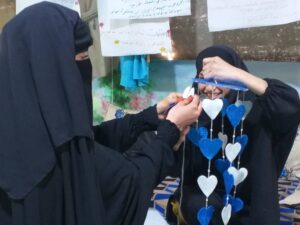Executive summary
Eight years after peaceful protests started in Syria, approximately half of the country’s population has had to flee from violence. An estimated 6.2 million people are internally displaced, with over 1.6 million population movements recorded between January and December 2018 alone. Meanwhile, Syria remains fragmented under multiple areas of control. This has a direct effect on the daily lives of local communities, which often varies across specific sub-regions and towns.
Against this backdrop, this report represents a case study on the effects of mass displacement and change of control on host communities and Internally Displaced Persons (IDPs) living in host communities in northern Syria. More specifically, the report focuses on the local situation in five main locations: Azaz, Albab, and Afrin district (Afrin, Rajo, and Jenderes).
In stark contrast, the situation in Afrin district, which came under de facto Turkish control after operation “Olive Branch” (January-March 2018), is characterized by high levels of instability. There, the displacement of local residents and the resettlement of IDPs have exacerbated pre-existing ethnic tensions. The situation is characterized by high discrepancies between local residents and IDPs in terms of access to personal security, livelihood, freedom of movement, and the ability to practice one’s own traditions. Local residents in the Afrin district have also been the victims of serious human rights violations and discriminatory practices imposed by armed opposition groups (AOGs), who are also seen as giving privileges to IDPs with connections to AOGs. The combination of these factors has created a sense of alienation among the original residents of Afrin district, which has resulted in a general sense of distrust and even hostility against IDPs. As the latter is also feeling disintegrated in their new host communities, the district’s social fabric is being torn apart.
The findings of this case study indicate that a clear distinction can be made between the situation in the towns of Albab and Azaz on the one hand, and the situation in Afrin district (Afrin, Jenderes and Rajo) on the other. Albab and Azaz have been under de facto Turkish control since the latter conducted operation “Euphrates Shield” that was concluded in early 2017, and are gradually enjoying a relative degree of stability. Residents (both locals and IDPs) are however still faced with harsh financial conditions and limited access to services.
Aside from the divergences between the situation in Afrin district and in that in Albab and Azaz, the growing Turkish influence is evident across both areas. Through providing official backup to military factions, significant investments in infrastructure rehabilitation, and direct administrative and financial support to local governance structures, Turkey has become the de facto ruler in the whole area. Therefore recommendations provided in this report are partially directed to Turkish authorities, in addition to a set of recommendations offered to international policymakers, donors, and civil society organizations.
Policy recommendations
To Turkish authorities
Humanitarian access
Allow for full and unimpeded humanitarian access throughout Northern Syria by intensifying cooperation and coordination with UN agencies, local NGOs, and INGOs. To this end, also simplify procedures for obtaining licenses and work permissions for local grassroots CSOs, Syrian NGOs and, INGOs.
Ensure the safe, voluntary, and dignified return of IDPs and refugees
Minimize restrictions on freedom of movement and open crossing points for IPDs who fled the area. Ensure that Syrian refugees residing in Turkey are not forced to return to Northern Syria, in line with UNHCR’s Thresholds and Parameters for Return.
Effective complaint mechanism
Establish a transparent complaint mechanism where residents, both local and IDPs, can register complaints regarding violations committed by AOGs, and ensure that allegations are investigated and that those responsible are held accountable.
Maximize efforts on Housing, Land, and Property (HLP) rights
Start exploring the possibilities to establish a local and transparent mechanism to address HLP issues, and ensure respect to HLP right by all actors.
Adherence to International Humanitarian Law (IHL)
Intensify efforts to guarantee that all armed actors operating in Northern Syria strictly adhere to IHL principles.
Demilitarisation of residential neighborhoods
Push towards the withdrawal of armed forces, groups, and individuals from residential areas and limit their presence to the outskirts of the districts. Maintenance of security issues should be handed over to a civil authority such as a local police force.
Inclusive governance
Intensify efforts to ensure inclusive and responsive civil local governance that serves local residents as well as IDPs.
To civil society actors and donors
Social cohesion
International and local NGOs, who are registered in Turkey or have access to the region, should include social cohesion in their programming and increase their advocacy efforts regarding this matter.
Livelihood and economic empowerment
Intensify support for local communities, whether IDPs
or local residents. Pay particular attention to sustainable livelihood interventions such as vocational training or financial support to small businesses.
Provision of basic services
Direct more efforts and resources to the provision of basic services, through collaboration and support to local entities whether local councils or local CSOs.
More space for local action
Intensify efforts to seek collaboration with local grassroots organizations and foster more conflict-sensitive and community-driven programming.
Additional research
Conduct or commission more area-specific research that focuses on thematic areas of relevance such as education, HLP issues, refugee return, and reconstruction. Such research data, if widely available, would enable all actors to take data-driven measures towards minimizing the effects of displacement.

